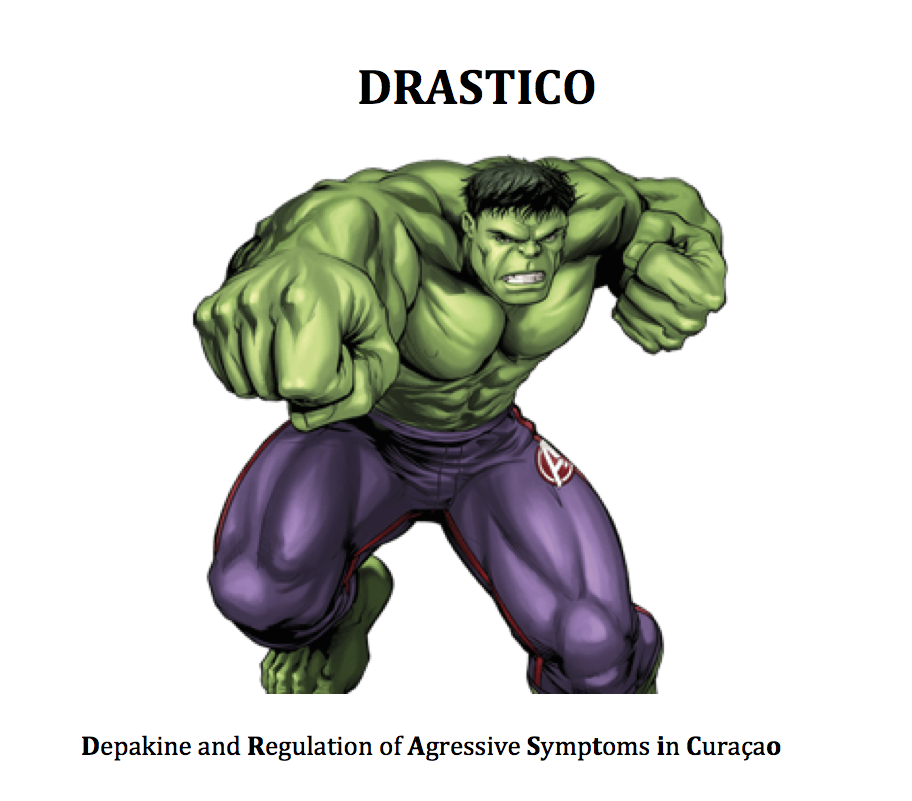DRASTICO: Domestic violence and valproic acid
Does valproic acid decreases aggression in perpetrators of domestic violence ?
Curacao, HI United States Clinical Interventions Mental HealthAbout our project

The problem we solve: Domestic violence is a serious problem, which affects more than 1 in 3 persons, especially women. Up till now, only psychological treatment is possible for perpetrators of domestic violence. The results of this psychological treatment are, however, disappointing and there is a lot of drop-out.
About our solution: We want to examine if valproic acid decreases aggression in perpetrators of domestic violence. If so, this may be an cost-effective intervention in domestic violence. This has never been examined in a Randomized Controlled Trial. We also include the activity of aggression related genes (MAOA, COMT, CD-13) in our analyses.
Progress to date:Our study has been approved by the Medical Ethical Committee in Curacao, where the study will take place. The inclusion has started recently.
About Our Team
Creator: David Vinkers
Bio: https://www.linkedin.com/profile/view?id=46551750
Title: Dr
Advanced Degree(s): MD, PhD
About Team Members
Henk Nijman
Psychologist, MA, PhD
Biography: http://www.fgb.vu.nl/nl/professionals/veiligheid/forensische-neuropsychologie-en-neuropsychiatrie/docenten/henk-nijman.aspx
Title: Psychologist
Advanced Degree(s): MA, PhD
Frans Heytel
Psychiatrist, MD
Biography: https://an.linkedin.com/in/frans-heijtel-92357a73
Title: Psychiatrist
Advanced Degree(s): MD
LinkedIn:
https://an.linkedin.com/in/frans-heijtel-92357a73
Inti Brazil
Psychologist, MA, PhD
Biography: www.intibrazil.com/cv.html
Title: Psychologist
Advanced Degree(s): MA, PhD
LinkedIn:
https://nl.linkedin.com/in/inti-brazil-2ab0b112
Micha van de Vorst
Psychologist, MA
Biography: https://an.linkedin.com/in/micha-van-de-vorst-9a577416
Title: Psychologist
Advanced Degree(s): MA
LinkedIn:
https://an.linkedin.com/in/micha-van-de-vorst-9a577416
About Our Company
-
Location: -
Curacao, Hawaii -
US
Founded: 2016
Product Stage: Prototype/MVP
YTD Sales: Less than $250,000
Employees: 3-5
Innovation Details
Intellectual Property Summary
Clinical Information
The aim of this study is to study how to improve the treatment and prevention of aggression in Antillean perpetrators of domestic violence in Curaçao. Previous studies show that life-course-persistent antisocial behaviour may be explained by genetic factors for about 40-50% (Craig & Halton, 2009; Miles & Carey, 1997; Rhee & Waldman, 2002; Moffitt, 2005; Tuvblad et al, 2009) and is linked to neuro-developmental processes (e.g. impulsivity and reactive aggression) These neuropsychological problems are related to a decreased serotonergic activity and an increased noradrenergic and dopaminergic neurotransmission (Barratt et al, 1999; Coccaro et al, 1998; Nelson et al, 1997; Nelson et al, 2007, Tremblay et al, 2005). In contrast, adolescence-limited offenders’ antisocial behaviour, which reflects the typical age-crime curve, is believed to be more strongly related to social processes (Steffensmeier et al, 1989). Importantly, genetic factors often interact with adverse environmental factors in the development of antisocial behaviour (Caspi et al, 2008; Reif et al, 2007; Rhee & Waldman, 2002; Retz & Rösler 2009), but it is largely unknown how the environment affects epigenetic markers modulating gene expression in domestic violence offenders.
Aggression may be explained by a high frequency of monoamine neurotransmitter polymorphisms that are related to conduct problems and delinquency (Thapar et al, 2005; Craig et al, 2007; Caspi et al, 2008). Monoamine oxidase A (MAOA) predominantly effects serotonin and norepinephrine pathways (Volavka et al, 2004). We showed in an earlier study an increased prevalence of MAOA in Antillean offenders in the Netherlands as compared to never convicted Antilleans (79.3 % vs. 46.2 %; p = 0.01; Vinkers et al, 2015). It can be reasoned that the aggressive behaviour linked to this increased MAOA prevalence may be alleviated with medication targeting neuronal disturbances in MAOA pathways (Huband et al, 2012). In line with this notion, earlier research showed that the effect of the anti-epileptic valproic acid (Depakine) is indeed related to the MAOA pathway (Wu & Shih, 2011). However, the C-O-methyltransferase (COMT) and T-cadherin (CDH-13) genes have also been linked to violent behaviour (Volavka et al. 2004, Tiihonen et al, 2015). COMT effects the dopamine and serotonin transporters and CDH-13 is related to cellular signalling pathways.
We are going to examine the effect of valproic acid (Depakine) on aggression in Antillean perpetrators of domestic violence. We include in our posthoc analysis the prevalence and activity of MAOA, COMT and CDH-13 genetic polymorphisms. Sixty participants will be included in the current study. Using saliva samples, COMT, CDH13 and monoamine neurotransmitter polymorphisms related to conduct problems and antisocial behaviour are examined (Thapar et al, 2005; Craig et al, 2007; Caspi et al, 2008). We will determine the epigenetic activity of these polymorphisms too (Wu & Shih 2011; Checknita, 2015), at baseline and the end of the study. We expect to understand the neurobiological mechanisms and the treatment of aggression in more depth trough this study.
Regulatory Status
Our study has been approved by the Medical Ethical Committee in Curacao, where the study will take place.
How we will use the funds raised
Funds will be used to include participants (they will be offered a gift check at the beginning and end of the study of about 15 USD), enable epigenetic analysis (to understand the causal mechanism), provide medication and placebo and dataregistration.
Thank You
Domestic violence is a serious problem and we want to examine the possible beneficial effect of valproic acid.
Thank you in advance for your help.
Updates
No updates found .
Supporters
-

01/11/2017 - Liked the project.Instant Feedback
Help us find best new ideas to fund by telling us what you think. Your feedback goes straight to the team behind this project in private, so tell them what you really think.
4Medstartr
Index Score4
Interest
Score0
Adoption
Score3
Likes0
Partners0
Pilots0
Follows-
This campaign has ended but you can still get involved.See options below.
$ 5,000 goal
Instant Feedback
Help us find best new ideas to fund by telling us what you think. Your feedback goes straight to the team behind this project in private, so tell them what you really think.


